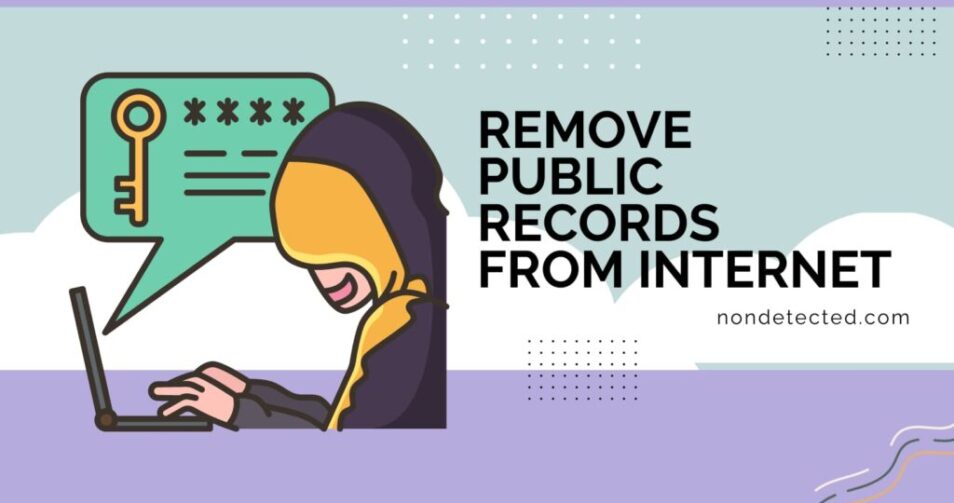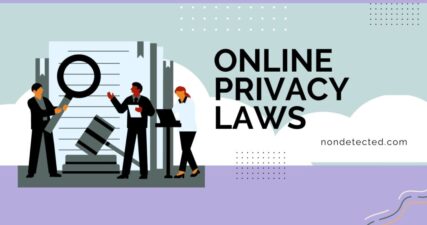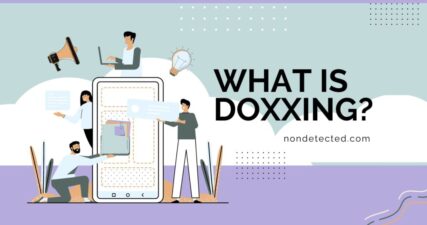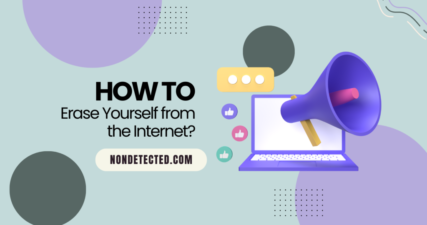Guide to Removing Your Public Records from the Internet

In today’s digital age, privacy has become a precious commodity. As someone who has spent years working with NonDetected, a company specializing in information removal, I’ve seen firsthand how public records on the internet can pose challenges to personal privacy.
It’s alarming how much of our personal information is readily available to anyone with an internet connection. But don’t worry, there are ways to reclaim your privacy, and I’m here to guide you through the process.
Ready to learn the process? Let’s start from basics.
Table of Contents
- What Counts as Public Records?
- Can Public Information be Removed From the Internet?
- The Risks of Public Records
- How to Remove Public Records from Internet? Step-by-Step Guide
- Additional Measures for Protecting Your Privacy
- The Role of Personal Branding in Protecting Your Privacy
- DIY vs Professional Services
- Regular Monitoring and Maintenance
- Ready to Remove Personal Information From Public Records?
What Counts as Public Records?
Public records are documents or pieces of information that are not considered confidential. These can include a wide array of documents and data that are maintained by government agencies and accessible to the public.
The type of information that can be found in public records is vast, but some common examples include:
Court Records
These can include civil and criminal proceedings, bankruptcy filings, legal judgments, mugshots and more.
Property Records
These records contain information about property ownership, including deeds, mortgages, and property tax information.
Vital Records
This category includes birth certificates, death certificates, marriage licenses, and divorce records.
Voter Registration
Your voter registration information is a matter of public record, including your party affiliation in some states.
Business Licenses
If you own a business, the details of your business license are likely public record.
Professional Licenses
The same goes for professional licenses, such as medical licenses, law licenses, etc.
The internet has made these records easily accessible, and while this transparency can have its benefits, it also means that your personal information might be just a few clicks away from anyone who decides to look for it.
Can Public Information be Removed From the Internet?

You might be asking, “Can public information be removed from the internet?” The answer is yes, but it’s not always straightforward.
While highly sensitive information like social security numbers, credit card numbers, and government ID numbers have legal protections, other types of information don’t have the same level of recourse for removal. Yes, this is where things can get a bit tricky.
As I’ve learned from my experience at NonDetected, even taking care of highly sensitive information doesn’t just magically happen. You have to be proactive about monitoring the information that appears about you online.
In the next sections, we’ll delve into the nitty-gritty of how to remove public records from the internet. I’ll share my personal tips and strategies, and hopefully, by the end of this guide, you’ll feel more empowered to remove personal information and take control of your online privacy.
So, let’s move forward to the next sections.
The Risks of Public Records
Having your public records readily accessible online can pose several risks. The most obvious one is a breach of privacy. It’s unsettling to think that anyone with an internet connection can find out where you live, who you’re married to, or what property you own. This information can be used for nefarious purposes, such as stalking, harassment, doxxing or even identity theft.
Another risk is the potential for misinformation. Public records can sometimes contain errors, and if these erroneous records are made public, they can lead to misunderstandings or false assumptions.
For example, a mistake in a court record could lead people to believe you have a criminal history that you don’t actually have. Should I say how this can seriously harm your reputation?
Finally, there’s the risk of old information haunting you. Public records can bring to light past mistakes or embarrassing moments that you’d rather forget. A past bankruptcy or an old divorce record can paint an inaccurate picture of who you are now.
As someone who has worked with NonDetected, I’ve seen how these risks can affect people’s lives. But I’ve also seen how taking control of your public records can mitigate these risks and help you maintain your online privacy.
How to Remove Public Records from Internet? Step-by-Step Guide
Now, let’s get into the practical steps of how to remove public records from the internet. This process can be time-consuming and sometimes frustrating, but from my experience, it’s worth the effort.
Here’s a step-by-step guide based on the strategies we use at NonDetected:
1️⃣ Identify the Information
Start by identifying all the private information that you want to remove or hide online. This includes searching through web results, images, videos, news clips, etc., that are attached to your name online.
2️⃣ Change Your Address and Phone Number
Consider getting a P.O. Box or a separate phone line for documentation or business purposes. This can help you keep your actual home address and personal phone number private.
3️⃣ Visit the County Clerk’s Office
Request to review all public records related to you and ask what information can be removed, redacted, or modified from these records. This can include court records, property records, and other documents.
4️⃣ Request Removal from Data Brokers and People Search Sites
These are data aggregation sites (also known as data brokers), and people search sites like Radaris, Peoplefinders, Spokeo, Intelius, Truthfinder, Checkmate, and Peoplelooker. Most of these sites are free to provide an opt-out request form.
To opt out from your public records being available online, you should just contact a people search site with a legal request. Many people search websites also offer opt out page, so you can use those pages to remove sensitive information.
Take into account, this process can be challenging, and it’s not a one-time project. It requires regular monitoring and maintenance. But don’t worry, you’re not alone in this.
If tracking down and opting out of every data broker site feels endless, some companies offer help with removing personal information from public listings. This kind of support can be especially useful when your address, phone number, or email shows up across dozens of sources.
Companies and websites like NonDetected are here to help you navigate this process and ensure your information is secure.
Additional Measures for Protecting Your Privacy
Beyond removing public records, there are other steps you can take to protect your privacy online. Here are some additional measures I recommend based on my experience at NonDetected:
Adjust Social Media Settings ✅
Social media sites often share more information than you might realize. Make sure to review your privacy settings on all social media accounts and limit what information is publicly accessible.
Delete Old Profiles ✅
If you have old profiles on social media sites or forums that you no longer use, consider deleting them. They might contain personal information that you’d rather not have available online.
Use a Virtual Private Network (VPN) ✅
A VPN can help protect your privacy by masking your IP address and encrypting your internet connection.
Be Careful with Sharing Personal Information ✅
Be mindful of what personal information you share online, even on trusted sites. Once information is online, it can be difficult to remove.
The Role of Personal Branding in Protecting Your Privacy

Another strategy that can help protect your privacy is building a strong personal brand online. By creating positive content about yourself, you can help suppress personal information in search engines’ results. Here are some tips:
Create a Personal Website
A personal website can serve as a central hub for your online presence. It’s a place where you can control the narrative about yourself.
Be Active on Social Media
Regularly posting positive content on social media can help push down any negative or private information in search engine top results.
Publish Articles or Blog Posts
Publishing articles or blog posts on reputable platforms can help establish your expertise and build a positive online reputation.
Engage in Online Communities
Participating in online communities related to your interests or profession can help you build a positive online presence.
Remember, building a personal brand isn’t just about suppressing private information. It’s also about showcasing who you are and what you bring to the table.
At NonDetected, we often help our clients not only remove unwanted information from search websites but also build a strong, positive online presence.
DIY vs Professional Services
Now, you might be wondering whether you should handle the removal of public records yourself or hire a professional service. From my experience at NonDetected, I can tell you that both options have their pros and cons.
Doing it yourself can save you money, and you’ll have complete control over the process. However, it can be time-consuming, complicated, and sometimes frustrating. You’ll need to regularly monitor various sites, submit removal requests, and follow up to ensure your information has been removed.
On the other hand, hiring a professional service can save you a lot of time and hassle. Companies like NonDetected specialize in this field and have the expertise to handle the process efficiently.
Even after a public record is removed from a website, it can take time for the listing to disappear from search engines. If it keeps showing up in search results, professional help is available to get those links removed or deindexed faster.
We understand the ins and outs of different databases, know how to submit effective removal requests, and can handle the regular monitoring and maintenance required to keep your information off the internet.
So, if you’re feeling overwhelmed by the process or if your efforts to remove your information aren’t successful, consider reaching out to a professional service. We’re here to help.
Regular Monitoring and Maintenance
I can’t stress this enough: removing public records from the internet is not a one-time project. It’s an ongoing task. New public records can appear at any time, and information that you’ve removed can sometimes reappear.
That’s why regular monitoring of google search results is crucial. I recommend setting up Google alerts for your name and regularly checking the major people search sites to see if your information has reappeared. If it has, you’ll need to submit a new removal request.
If the record was part of a news story or mentioned in online media, that coverage might continue to show up—even after the record itself is gone. In these situations, working with a team that helps remove outdated or damaging articles can reduce long-term impact on your online reputation.
At NonDetected, we provide ongoing monitoring and maintenance services to ensure our clients’ information stays off the internet. We understand that maintaining your online privacy is a continuous effort, and we’re here to support you in that journey.
Ready to Remove Personal Information From Public Records?
Taking control of your public records and online privacy can feel like a daunting task. But as I’ve learned from my years of experience at NonDetected, it’s not only possible, it’s also empowering. By being proactive and taking the steps outlined in this guide, you can significantly reduce the amount of your personal data and information that’s available about you online.
Remember, this is not a one-time project but an ongoing effort. Regular monitoring and maintenance are key to ensuring your private information stays private. And if the process feels overwhelming, do not forget you’re not alone. Companies like NonDetected are here to help you navigate this process and ensure your information is secure.
I hope this guide has empowered you to take control of your digital footprint and online privacy. Remember, your personal information is just that – personal. You have the right to control who has access to it.


